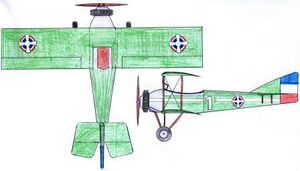Engineering:Hanriot HD.32
| HD.32 | |
|---|---|

| |
| Role | Military trainer |
| Manufacturer | Hanriot, Zmaj aircraft from Zemun Yugoslavia |
| First flight | 1924 |
| Primary user | Aéronautique Militaire |
The Hanriot HD.32 was a military trainer aircraft built in France in the 1920s. Derived from the HD.14 and sharing the same basic configuration as it, the HD.32 was a substantially revised design, with redesigned tailplane, undercarriage, and wings of shorter span. The HD.14's wooden construction was replaced in part with metal structure.
The HD.32 was Hanriot's entry in a 1924 Aéronautique Militaire competition to select a new trainer, and as the winner, was ordered in quantity as the HD.32 EP.2. The type HD.320 was also built in Yugoslavia by Zmaj aircraft in Zemun, using a Salmson 9Ac, Siemens Sh12 or Walter NZ-120, engine.
In 1927, the Paraguayan Military Aviation School received three HD.32 which received the serials E.1, E.2 and E.3 (E meaning Escuela, School).[1] They were supplemented by five Fleet 2 trainers in 1931,[2] but remained in use until the end of the Chaco War, when they were retired.[3]
Operators
 France
France
 El Salvador
El Salvador
 Japan
Japan
- One aircraft only.
 Paraguay
Paraguay
- Paraguayan Air Force - Three aircraft purchased in 1927 for the Military Aviation School.[2]
 Kingdom of Yugoslavia
Kingdom of Yugoslavia
- 12 aircraft H.320 mod. 1926, Product: Aeroplanes Hanriot France
- 45 aircraft H.320 mod. 1928, Product: Zmaj - Zemun Yugoslavia
Variants
- HD.32 - main production version for Aéronautique Militaire with Le Rhône 9C engine
- HD.320 - version with Salmson 9Ac engine (12 built + 45 Zmaj Zemun Yugoslavia)[4][5]
- HD.321 - version with Clerget 9B engine (11 built, plus 4 converted from HD.32 and four converted from HD.14)
Specifications
General characteristics
- Crew: Two, pilot and observer
- Length: 7.11 m (23 ft 4 in)
- Wingspan: 9.20 m (30 ft 2 in)
- Height: 2.95 m (9 ft 8 in)
- Wing area: 29.8 m2 (321 sq ft)
- Empty weight: 510 kg (1,120 lb)
- Gross weight: 760 kg (1,680 lb)
- Powerplant: 1 × Le Rhône 9C , 60 kW (80 hp)
Performance
- Maximum speed: 120 km/h (75 mph, 65 kn)
- Range: 200 km (125 mi, 109 nmi)
- Service ceiling: 3,850 m (12,600 ft)
See also
Related lists
Notes
- ↑ Sapienza 1995, p. 41
- ↑ 2.0 2.1 Hagedorn & Sapienza 1997, p. 123
- ↑ Sapienza 1995, p. 42
- ↑ Petrovic, Ognjan M. (2000). Military Aeroplanes of Kingdom of Jugoslavia 1918-1930. Beograd: MJVB LET-Flight. pp. 21–84.
- ↑ Janić, Čedomir; O. Petrović (2011). Short History of Aviation in Serbia. Beograd: Aerokomunikacije. ISBN:978-86-913973-2-6.
References
- Taylor, Michael J. H. (1989). Jane's Encyclopedia of Aviation. London: Studio Editions. pp. 470.
- World Aircraft Information Files. London: Bright Star Publishing. pp. File 896 Sheet 11.
- Hagedorn, Dan; Sapienza, Antonio Luis (1997). Aircraft of the Chaco War 1928–1935. Atglen, Pennsylvania, US: Schiffer Publishing Ltd.. ISBN 0-7643-0146-2.
- Janić, Čedomir; O. Petrović (2011). Short History of Aviation in Serbia. Beograd: Aerokomunikacije. ISBN 978-86-913973-2-6.
- Petrovic, Ognjan M. (2000). Military Aeroplanes of Kingdom of Jugoslavia 1918-1930. Beograd: MJVB LET-Flight. pp. 21–84.
- Sapienza, Antonio Luis (June 1995). "Des avions d'entrainement Français au Paraguay" (in fr). Avions: Toute l'aéronautique et son histoire (28): 40–42. ISSN 8650 1243- 8650.
 |

